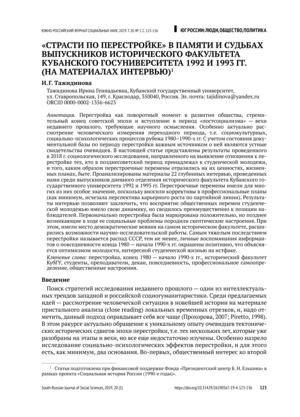Abstract
Perestroika as a watershed in the development of Soviet society, as well as the collapse of the Soviet Union and entering the “post-socialism” period, are the milestones of the recent past that need a scientific reflection. It is especially important to consider the “human dimension” of the transition period, that is, the socio-cultural and socio-psychological processes at the turn of the 1980s — 1990s. If we take into account the poor state of the document database for the period of Perestroika, the oral testimony of eyewitnesses is an important source of knowledge about it. The research contains the results of the sociological survey carried out in 2018 and aimed at identifying the younger generation of Soviet people’s attitude towards Perestroika. Besides, the interviewees were asked in what way the changes had affected their values and life prospects, and their way of life. We have analyzed 22 in-depth interviews of the full-time Historical Department graduates’ (the classes of 1992 and 1993) at Kuban State University.For many of the graduates, changes brought about by Perestroika were of particular significance, since they amended their professional growth plans (at the very least, their career development as party members collapsed). The results of the research allow us to conclude that the student youth’s perception of social changes had its dynamics but mainly came down to passive observation. At its first stages, Perestroika was perceived with enthusiasm, yet social problems on its way gave rise to skepticism. On the other hand, democratic trends at the Department of History itself have improved the scope of research work. According to the interviewees, the worst aftereffect of Perestroika was the collapse of the USSR. Yet, their personal recollections concerning daily routine in the late 1980s — early 1990s are positive, which is due to young age optimism and diverse student life at the Department.
Keywords
Acknowledgements
This article is a result of the study supported by the Boris Yeltsin Presidential Center Foundation within the framework of the project ‘The Social History of Russia (1990s).References
- Gudkov, L. D., Dubin, B. V. (1991). Uzhe ustali? Sociologicheskie zametki o literature i obshchestve. [Already tired? Sociological Notes on Literature and Society]. Literaturnoe obozrenie [Russian Studies in Literature], 10, 97–99.
- Il’inskij, I. M. (2001). Molodezh’ i molodezhnaya politika [Youth and Youth Policy]. M.: Golos.
- Koehn, S. (2007). “Vopros voprosov”: pochemu ne stalo Sovetskogo Soyuza? [The Cardinal point: Why has the Soviet Union Collapsed?] M.: AIRO-HKHI.
- Koposov, N. E. (2001). Kak dumayut istoriki [In the Historians’ View]. M.: Novoe literaturnoe obozrenie.
- Kotkin, S. (2001). Armageddon Averted: The Soviet Collapse, 1970–2000. Oxford.
- Kovalevskaya, Yu. N. (2014). Perestrojka v obydennom soznanii dal’nevostochnikov: tridcat’ let spustya. [Perestroika as the Everyday Experience (According to the Memorials in the Far East of Russia)]. Rossiya i ATR. [Russia and the Pacific], 1, 66–79.
- Levinson, A. G. (2011). 1990-e i 1990-j: sociologicheskie materialy. [1990 and 1990s: Sociological Materials]. In 1990-j: opyt izucheniya nedavnej istorii: Sbornik statej i materialov [1990: the Experience of Studying Recent History: A Collection of Articles and Materials] (489–503). M.: Novoe literaturnoe obozrenie.
- Muhamedzhanov, M. M. (2008). Komsomol: poslednie desyat’ let (1981–1991) [Komsomol: the Last Ten Years (1981–1991)]. Retrieved from http://www.zpu-journal.ru/e-zpu/2008/6/Mukhamedzhanov_Komsomol
- Piretto, G.-P. (1998). 1961: il sessantotto a Mosca. Bergamo: Moretti & Vitali.
- Pok de Feliu, R. (2005). Ehpoha peremen: Rossiya glazami ispanskogo zhurnalista [The Era of Change: Russia through the Eyes of a Spanish Journalist]. M.: Vremya.
- Portelli, A. (1991). The Death of Luigi Trastulli and Other Stories: Form and Meaningin Oral History. Albany, NY.
- Poslednee sovetskoe pokolenie v zhizneopisaniyah ego predstavitelej. YUrij Beschastnyj (2011). [The Last Soviet Generation in the Biographies of its Representatives. Yury Beschastny]. Krasnodar: Kuban’kino.
- Prohorova, I. D. (2007). Nedavnee proshloe kak vyzov istoriku [The Recent Past as a Challenge to a Historian]. Novoe literaturnoe obozrenie [Russian Studies in Literature], 83, 7–10.
- Raviot, J.-R. (2016). La civilisation soviétique, de l’URSS à la Russie, de 1917 à nos jours. Paris: Editeur: Ellipses Marketing.
- Sbornik vospominanij, sostavlennyj A. Yu. Klimenko na osnove interv’yu, vzyatyh eyu u vypusknikov i prepodavatelej Istoriko-Arhivnogo instituta. (2018). [A Collection of Memoirs Compiled by A. Yu. Klimenko on the Basis of Her Interviews of the Graduates and Lecturers of the Institute of History and Archives.]. Retrieved from https://www.rsuh.ru/iai/about/genius/memories-of-institute-of-history-and-archives/
- Sokoloff, G. (2003). Metamorphose de la Russie, 1984–2004. Paris: Editeur: Fayard.
- Tazhidinova, I. G. (2016). Kar’era ili prizvanie: zachem komsomol’skie aktivisty vtoroj poloviny 1980-h gg. postupali na istfak? [Career or Vocation: Why did Komsomol Activists Enter the Department of History]. In Lichnost’. Obshchestvo. Gosudarstvo. Problemy razvitiya i vzaimodejstviya. Sbornik statej 34 Adlerskih chtenij [Personality. Society. State. Problems of Development and Interaction. Collection of Articles 34 Adler Readings]. (214–225). Krasnodar: Tradiciya.
- Tazhidinova, I. G., Ufimceva, Yu. A. (2012). Problemy professional’nogo samoopredeleniia vuzovskogo prepodavatelia (na materialakh interv’iu s prepodavateliami FISMO) [Problems of Professional Self-determination of a University Teacher (Based on Interviews with FISMO Teachers)]. Golos minuvshego [The Voice of the Past], 1, 58–70.
- Veber, A. B. (2005). Proryv k svobode: o perestrojke dvadcat’ let spustya (kriticheskij analiz): Sbornik statej [Breakthrough to Freedom: on Perestroika Twenty Years after (A Review): Collected Papers]. M.: Al’pina Biznes Buks.
- Yurchak, A. (2006). Everything Was Forever, Until It Was No More: the Last Soviet Generation. Princeton, N.J.
 Русский
Русский


